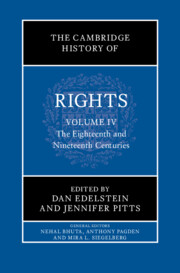Book contents
- the cambridge history of rights
- The Cambridge History of Rights
- The Cambridge History of Rights
- Copyright page
- Contents
- Figures
- Contributors to Volume IV
- General Introduction
- A Note on Translations
- Introduction to Volume IV
- Part I A Revolution in Rights?
- Part II Postrevolutionary Rights
- Part III Rights and Empires
- Index
- References
Part III - Rights and Empires
Published online by Cambridge University Press: 22 January 2025
- the cambridge history of rights
- The Cambridge History of Rights
- The Cambridge History of Rights
- Copyright page
- Contents
- Figures
- Contributors to Volume IV
- General Introduction
- A Note on Translations
- Introduction to Volume IV
- Part I A Revolution in Rights?
- Part II Postrevolutionary Rights
- Part III Rights and Empires
- Index
- References
- Type
- Chapter
- Information
- The Cambridge History of Rights , pp. 435 - 629Publisher: Cambridge University PressPrint publication year: 2024

